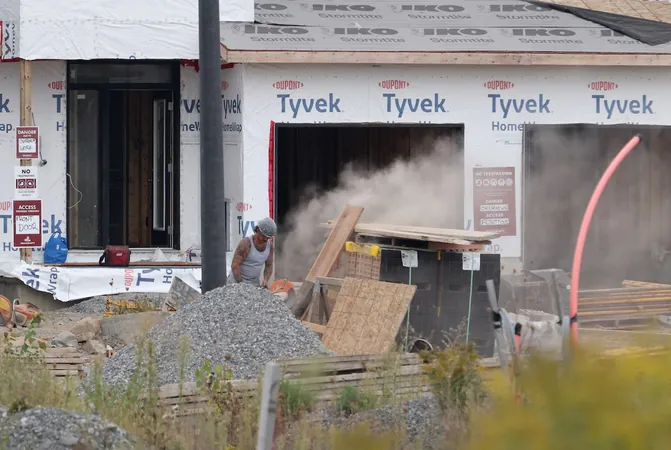
Will New Mortgage Policies Save Canada's Struggling Real Estate Market? Experts Weigh In!
2024-10-09
Author: Emma
Skepticism Among Housing Developers
Housing developers across Canada are expressing skepticism about the federal government’s latest mortgage policy changes and their potential to stimulate demand for newly built homes. Despite recent efforts to make housing more accessible, industry insiders believe these measures may fall short of addressing the root issues facing the market.
Impact of Recent Policy Changes
With preconstruction home sales plummeting, builders have pinned their hopes on government policies aimed at reducing construction costs and facilitating easier buyer access. However, the changes, announced in mid-September, include loosening mortgage rules that experts argue will have minimal impact, especially as the prices for preconstruction homes have begun to eclipse those of existing properties, compounded by persistently high borrowing costs.
Mortgage Terms and Buyer Considerations
The government's recent modifications allow first-time homebuyers to secure a 30-year insured mortgage for new builds, increasing the amortization period from 25 years. By December 15, this rule will extend to other buyers purchasing a primary residence or homes for their close relatives. While stretching the amortization period aims to lower monthly mortgage payments, experts warn that it may also result in buyers facing greater debt levels and paying significantly more in interest over time.
Industry Leaders' Views
Industry leaders, including Stephen Diamond of DiamondCorp, are unconvinced. “It will have a minimal impact,” he stated, underscoring that the relief provided by these policies is insufficient to drive significant market change. Barry Fenton, CEO of Lanterra Developments, echoes this sentiment, suggesting that the government should consider even longer amortization periods for preconstruction purchases to provide greater relief.
Investor Concerns
A significant portion of preconstruction home buyers are investors, and many may not qualify for the newly established insured mortgage options. With developers like DiamondCorp typically requiring a 20% down payment, many investors might find themselves ineligible for the favorable terms set forth by the new policy, limiting its effectiveness.
High Prices in the Preconstruction Market
Additionally, the average price of preconstruction condos remains strikingly high. Recent reports reveal that in Toronto, the average price per square foot for a new condo reached $1,529, leading to a staggering total of approximately $841,000 for a standard 550-square-foot unit. In contrast, the resale market is showing more favorable pricing, with existing condos averaging $708,000 in September, suggesting that buyers are increasingly opting for older properties over new constructions.
Concerns from the Canada Mortgage and Housing Corporation (CMHC)
The Canada Mortgage and Housing Corporation (CMHC) has raised alarms regarding potential declines in new housing construction due to waning investor interest. Aled ab Iorwerth, the deputy chief economist at CMHC, stresses that while the extended mortgage period may provide incremental support, it is not enough to spur the volume of new construction necessary given Canada’s growing population. Recent CMHC data indicates a decline in new condo starts in major Canadian cities, raising concerns of a market downturn, particularly in Toronto, where sales have plummeted to levels not seen in nearly three decades.
Investors Struggling Financially
Urbanation’s research further complicates the picture, revealing that over 80% of new condo investors in Toronto are struggling financially, with rising ownership costs outpacing rental income. As average monthly expenses for new condos soar to $3,250—up 21% year-on-year—there is palpable concern among investors about the long-term viability of these investments.
Conclusion and Future Outlook
In summary, while the government’s new mortgage rules attempt to alleviate some pressures, they appear insufficient to reignite the flagging real estate market. With high prices, a significant portion of investors being excluded from favorable mortgage options, and construction facing potential declines, the future of Canada's new home market remains uncertain. Will further government intervention be the key to unlocking demand, or are we facing a prolonged downturn in real estate? The experts are watching closely.









 Brasil (PT)
Brasil (PT)
 Canada (EN)
Canada (EN)
 Chile (ES)
Chile (ES)
 España (ES)
España (ES)
 France (FR)
France (FR)
 Hong Kong (EN)
Hong Kong (EN)
 Italia (IT)
Italia (IT)
 日本 (JA)
日本 (JA)
 Magyarország (HU)
Magyarország (HU)
 Norge (NO)
Norge (NO)
 Polska (PL)
Polska (PL)
 Schweiz (DE)
Schweiz (DE)
 Singapore (EN)
Singapore (EN)
 Sverige (SV)
Sverige (SV)
 Suomi (FI)
Suomi (FI)
 Türkiye (TR)
Türkiye (TR)